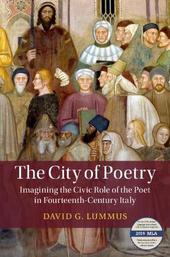
|
The City of Poetry: Imagining the Civic Role of the Poet in Fourteenth-Century Italy
Hardback
Main Details
Description
What did it mean to be a poet in fourteenth-century Italy? What counted as poetry? In an effort to answer these questions, this book examines the careers of four medieval Italian poets (Albertino Mussato, Dante Alighieri, Francesco Petrarch, and Giovanni Boccaccio) who wrote in both Latin and the Italian vernacular. In readings of defenses of poetry, speeches and letters on public laurel-crowning ceremonies, and other theoretical and poetic texts, this book shows how these poets viewed their authorship of poetic works as a function of their engagement in a human community. Each poet represents a model of the poet as a public intellectual - a poet-theologian - who can intervene in public affairs thanks to his authority within texts. The City of Poetry provides a new historicized approach to understanding poetic culture in fourteenth-century Italy which reshapes long-standing Romantic views of poetry as a timeless and sublimely inspired form of discourse.
Author Biography
David G. Lummus is the co-director of the Center for Italian Studies and Devers Family Program in Dante Studies and a visiting assistant professor of Italian at the University of Notre Dame. He has published on fourteenth-century Italian poetry and poetics, especially Giovanni Boccaccio, and the reception of classical culture in medieval Italy. He is the co-editor of A Boccaccian Renaissance (2019).
Reviews'David Lummus' new book offers the first full-scale study of how four major poet-intellectuals from the fourteenth century - Mussato, Dante, Petrarch and Boccaccio - understood and represented their roles as poets within a civic context and engaged with imagined and real audiences communities. Lummus argues that these figures used their writings, above all their Latin poetry and other writings in defence of poetry, both to construct and to authorize their public and civic roles. A major scholarly achievement, Lummus' elegant book provides for the first time lucid and detailed accounts in English of the civic concerns of the four poets considered, and of their major Latin works, and of the dialogues, differentiations, and rewritings that we find in and between them.' Simon Gilson, Magdalen College, Oxford University
|